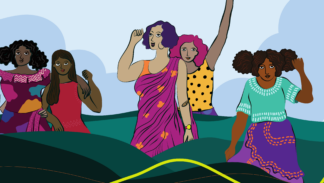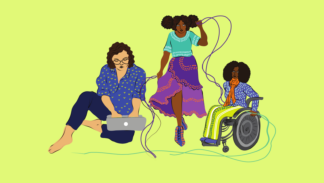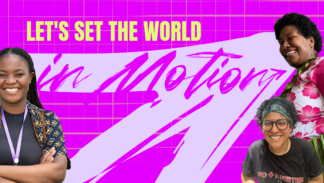Measuring a year in global resistance and interconnected movements
What a year it has been. On January 20, 2017, the new U.S. administration took office with President Trump’s Inauguration marking the official transition of power. And on the following day, millions of people from various backgrounds came together for Women’s Marches not just in Washington, D.C., but in cities across the United States, and around the entire globe—to stand up for democratic principles, class, gender and racial justice, immigrant rights, and much more.
It has been a year of rollbacks, threats, damaging and regressive policies, and fear.
But it has also been a year marked by new forms of resistance and resilience. It’s been a year of women leading and building new movements, speaking out and demanding their voices be heard, and not stepping down until action has been taken. We’ve seen the power of cross-movement organizing and the creativity of unapologetic advocates for justice working for a better world for all.
As we look back on the past year, and reflect on this critical moment, we call on every one of you to join us because what happens next for women around the globe depends on each of us.
Actions felt around the world
The actions, policies, and rhetoric of the U.S. administration over the past year have owned the international news cycle. So rather than dwell on all the ways in which the administration took steps that carry implications for women globally, we will focus on some of the key areas where our partners are mobilizing against the negative impacts on women, girls, and LGBTQI individuals around the world.
In one of his first executive actions in office, just a few days after the Inauguration, President Trump reinstated and expanded the Global Gag Rule, which carries extreme implications for women’s health and rights. For the first time, the Global Gag Rule now applies to all global health funding—including HIV and AIDS, malaria, tuberculosis, and more. The expansion of this damaging policy means that women around the world will lack access to reliable and comprehensive health care, and will not be able to make informed decisions about their options when pregnant. This action deals a major blow to vital health services that save millions of lives and will rollback gains that have been made at the global level to improve women’s and girls’ health and rights, including through the United Nations Sustainable Development Goals.
As has been the case when the Global Gag Rule has been in effect in the past, Global Fund for Women’s grantee partners have been monitoring the policy’s impact on critical services in their communities. And they have been advocating for more funding for sexual and reproductive health and rights to fill the gap left by the Global Gag Rule—and raising their voices to influence governments, donors, and funding mechanisms like the SheDecides initiative to ensure resources reach grassroots women’s groups and the most marginalized populations.
Women’s groups have also wasted no time in taking action to ensure that the Global Gag Rule does not hamper women’s access to sexual and reproductive rights. For instance, Línea Aborto Libre, a collective of feminists working for abortion rights in Chile and Global Fund for Women grantee partner, has set up 24-hour hotlines to ensure that women have access to safe abortion information, care, medicine, and back-up support when needed.
The past year has seen the continued rise in fundamentalisms impacting our partners in all regions that we work, spanning many religions and cultures. For instance, while fundamentalist forces escalate in the United States, we’ve also seen the rising power of Catholic and Evangelical fundamentalists that have permeated governments in Latin America attempting to block powerful women’s movements—like in Brazil where the government is pushing forward an anti-woman agenda, and women’s groups like SOS Corpo—Feminist Institute for Democracy are adapting strategies, and mobilizing a growing movement to prevent rollbacks in women’s rights. The U.S. administration’s often damaging rhetoric and foreign policies like the so-called travel ban have further resulted in growing isolationism and a dangerous rise in misperceptions and misunderstandings of religions, cultures, and refugees. We have also seen a disturbing crackdown on democratic principles and closing of civil society space across the globe and in the U.S. through the travel ban, and targeting of Muslims, Black Lives Matter activists, immigrants, and organizations who are protecting the rights of all Americans.
And the decision to withdraw the United States from the Paris Agreement to lower global emissions and mitigate the effects of climate change, signaled the administration’s denial of climate science which could be disastrous. The impact of climate change is being felt around the world, with no shortage of extreme weather and climate events over the past year, and is interwoven with critical issues of women’s rights including land rights, sustainable farming, economic justice, and freedom from violence.
Resistance taking many forms
Over the past year, we’ve witnessed time and again—in the U.S. and around the world—the power of women not only to resist and push back against these threats and rollbacks, but to advance human rights and push forward meaningful and long-lasting social change. In Chile, the resilient women’s movement advanced a historic new abortion law when the Constitutional Tribunal voted to ease the country’s total ban, passing legislation that legalizes abortion under three cases. In the wake of the deadly earthquakes in Mexico, women’s leadership and resilience was on full display as Mexico’s women’s fund, Semillas, immediately began developing a reconstruction and rebuilding campaign in order to meet immediate and long-term needs, spearhead recovery, and rebuild Mexico in a participatory and sustainable way—all while advancing women’s rights.
In the Middle East and North Africa, women human rights defenders are organizing into coalitions of solidarity, skills-sharing, and action, to mitigate the effects of government crackdowns on civil society, advance the safety and integrated security of activists, and hold governments accountable using national laws and processes, and UN mechanisms. In South Sudan, Global Fund for Women’s partners are working to reframe humanitarian assistance with a feminist perspective, to ensure that the unique needs of women in crisis settings are met, that women are supported as front-line defenders and rebuilders of their communities, and that women are involved as leaders in reconstruction processes so that long-term change to advance women’s human rights and gender equality is not lost.
Indeed, there are countless examples of how women have been resisting, speaking out, and taking up more space over the past year—in countries around the world and in the U.S. The groundswell of women speaking out and sharing their experiences of sexual harassment with #MeToo has driven critical conversations, power shifts, and a new Time’s Up Legal Defense Fund and movement to end sexual harassment and inequality in the workplace across industries. The Ni Una Menos campaign against widespread misogyny and the murders of women has spread throughout Latin America, and across the African continent social media campaigns such as #UrgentAction4Women and #EndFGM (female genital mutilation) have resulted in cross-movement organizing and solidarity.
From Chile to South Sudan to the United States, it was a year of women’s rights activists taking to the streets in powerful displays of the collective force and voice of women’s movements demanding change and pushing back against rollbacks. Women are building a powerful global resistance and we’re all the more hopeful because of it.
A glimpse at our roadmap for women’s rights in 2018
Looking forward to the year ahead for women’s rights, we at Global Fund for Women have been working closely with our partners around the world to set an agenda that ensures we’re getting money and attention to where it will make the biggest difference in the fight for gender equality and justice. We’re focused on continuing to push back against rollbacks and to strengthen powerful women’s and cross-issue movements.
Here are some of the key issues for women’s rights globally that we’re prioritizing in our roadmap for the year ahead:
- Documenting the impact of the Global Gag Rule in grassroots communities on women, young people, and LBTQI individuals in particular;
- Strengthening women’s movements that are pushing back against rollbacks in reproductive justice and abortion rights, and leading the way for safe and legal abortion;
- Challenging the influence of growing fundamentalist voices, and supporting the right of feminists to have voice and authority in matters of religion and religious interpretation;
- Growing women-led responses to climate change by ensuring more women have a seat at the table where policy decisions are made, driving more resources to women farmers and indigenous women land defenders, and sharing the voices of women leading sustainable efforts to mitigate and adapt to the effects of global warming;
- Creating more spaces for learning, collaboration, and adaptation across women’s rights organizations, movements, and funds;
- Strengthening a pipeline of young movement leaders who are organizing across issues and developing innovative approaches to social change.
Renewing our call for global solidarity and action
As we move into 2018, we’re embracing and expanding our movements approach to grantmaking and advocacy because we know that what we need in the world is a deeper understanding that our lives are interconnected, and that our future lies in global solidarity and action. Together, we can develop and unleash new ways of mobilizing, new ways of resisting, and new ways of building and sustaining integrated movements for positive change.
While the U.S. administration has amplified and added to an alarming era of isolationism, we at Global Fund for Women are standing with global women’s movements in countering this trend by promoting global solidarity and connectedness as key to creating a world where justice reigns for all.
So, in the year ahead, we hope that you renew your commitment to engage more deeply, think about your role in the global community regardless of where you live or come from, and deepen your global solidarity and your investment in the world’s future.
Let’s make sure this year is marked by global solidarity, growing resistance, and even stronger movements.
This is a time to really step it up for the world’s women—together.


